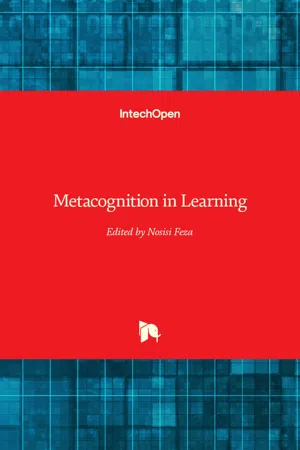Metacognition in Learning
About this book
Metacognition skills have been proven to have a positive relationship with learning. The strength of metacognition relies heavily on self-efficacy where a student understands his/her learning style, and the ability to use information gathered and align it with his/her learning style. In addition, knowing what you know and how you know it as a student plays a huge role in knowing what you do not know and linking it with what is close or relevant to it, that you know. It is about having skills and knowledge that empowers you to be an independent learner. Literature on classroom practices show a number of short-comings in diverse areas such as poor teacher knowledge, overcrowded classrooms, and lack of resources for learning. An independent student will strive under such an environment by studying independently, searching for resources, and finding multimodal ways of learning. It is also important to note that naturally, human beings are curious and want to learn in order to conquer their world. Hence, Piaget's work of intellectual autonomy cannot be ignored when exploring metacognition. If learning experiences were ideal and developmental, they would be no need to nurture metacognition. Unfortunately, the education systems remove students' curiosity by bringing fake environments into learning that impede creation and imagination. This book emphasises the power of metacognition at different levels of learning. It can be seen as a parallel intervention approach, with expanded knowledge on how to extend existing skills for young children, which is a pre-intervention. Authors in this book bring diverse viewpoints from diverse fields on how to nurture metacognition, thus giving the reader an opportunity to borrow strategies from other fields. This contribution is a mixture of empirical contributions and opinion pieces informed by review of literature.
Tools to learn more effectively

Saving Books

Keyword Search

Annotating Text

Listen to it instead
Information
Table of contents
- Metacognition in Learning
- Contents
- Preface
- Section 1 Strategies to Enhance Metacognition
- Section 2 Intrinsic Metacognitive Enablers
Frequently asked questions
- Essential is ideal for learners and professionals who enjoy exploring a wide range of subjects. Access the Essential Library with 800,000+ trusted titles and best-sellers across business, personal growth, and the humanities. Includes unlimited reading time and Standard Read Aloud voice.
- Complete: Perfect for advanced learners and researchers needing full, unrestricted access. Unlock 1.4M+ books across hundreds of subjects, including academic and specialized titles. The Complete Plan also includes advanced features like Premium Read Aloud and Research Assistant.
Please note we cannot support devices running on iOS 13 and Android 7 or earlier. Learn more about using the app
